Are you ready to discover your ‘why’ in entrepreneurship and unlock the potential of your business?
Our expert team is ready to guide you in defining your purpose, identifying unique solutions, and building an authentic brand that resonates with your target audience.
Understanding the ‘why’ in entrepreneurship is vital as it drives every action, decision, and strategy a business undertakes. It refers to the purpose or reason behind starting a business, with successful entrepreneurs identifying problems and finding unique solutions. Renowned author Simon Sinek emphasizes that consumers buy into a company’s ‘why’ more than its ‘what’. A strong sense of purpose can lead to higher market share gains, faster growth, and higher workforce satisfaction. Curiosity, inquiry, resilience, and effective problem-solving are key attributes for entrepreneurs. Ultimately, a strong ‘why’ helps build an authentic brand, fosters customer loyalty and employee engagement, and leads to higher profitability.
Table of Contents
- Understanding the Importance of ‘Why’ in Entrepreneurship
- Identifying New Problem Solutions: The Key to Successful Ventures
- The Role of Curiosity and Inquiry in Starting a Venture
- How to Tap into Your Inner Innovator: Finding Unique Solutions to Common Problems
- ‘Why?’ – The Question That Fuels Every Successful Start-Up
- Transforming Challenges into Opportunities: A Guide for Aspiring Entrepreneurs
- Breaking Down Barriers with Effective Problem-Solving Strategies
- Why Understanding the ‘Why’ is Essential for Startup Success
- ‘What’s Your Why?’ – Clarifying Your Purpose and Vision as an Entrepreneur
- Final Thoughts
Understanding the Importance of ‘Why’ in Entrepreneurship
Understanding ‘why’ in entrepreneurship is of utmost importance. It’s the driving force behind every action, decision, and strategy a business takes to achieve its objectives. The ‘why’ refers to the purpose or reason behind starting a venture – it’s about identifying a problem and finding a unique solution for it. Simon Sinek, author of “Start With Why,” emphasizes that people don’t buy what you do; they buy why you do it. Knowing your ‘why’ allows you to build an authentic brand identity that connects with consumers on an emotional level, encouraging them to not only buy your product but also believe in your cause.
According to a 2014 study by Deloitte, businesses with a strong sense of purpose are three times more likely to perform well than those without. They experience higher market share gains and grow on average three times faster than their competitors, all while achieving higher workforce satisfaction. Undoubtedly, entrepreneurs who understand their ‘why’ have clarity about their goals and values. This knowledge helps them make decisions aligned with their vision, even in times of uncertainty or adversity.
Identifying New Problem Solutions: The Key to Successful Ventures
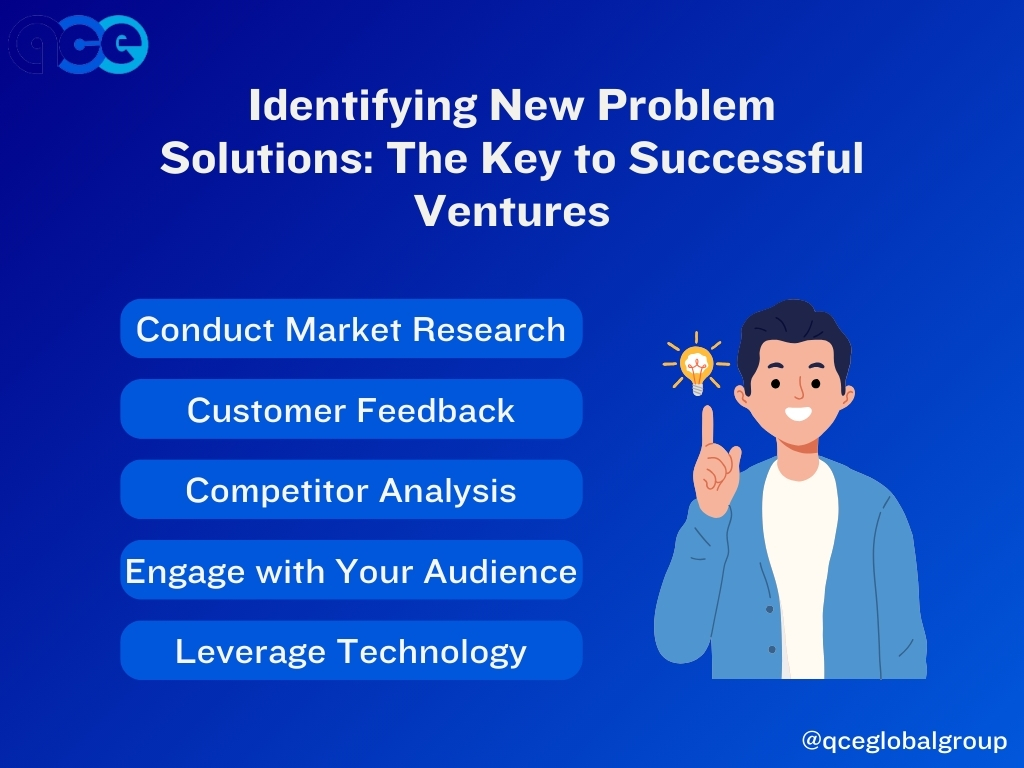
One key aspect of successful entrepreneurship lies in identifying new problem solutions. Essentially, we need to understand what issues exist in society that are unaddressed or inadequately addressed by existing businesses or platforms. In today’s fast-paced world where technology is rapidly evolving and consumer needs are constantly changing, there is always room for innovative solutions.
A notable example is the ride-hailing service Uber, which identified an unmet need for convenient transportation services across cities worldwide, transforming urban mobility as we know it today. Solving problems not only serves society but also provides lucrative opportunities for growth-driven entrepreneurs who are willing to challenge the status quo. This ability requires keen observation skills coupled with deep empathy towards potential users, enabling entrepreneurs to identify pain points and devise innovative solutions that truly meet user needs.
- Conduct Market Research: By conducting thorough market research, you can identify gaps in the market and understand the problems faced by consumers that are not currently being addressed.
- Use Social Listening: Monitor social media platforms and online forums to understand what issues and problems consumers are discussing.
- Customer Feedback: Actively seek feedback from customers to understand their pain points and needs.
- Competitor Analysis: By studying your competitors, you can identify areas where they are failing to meet customer needs, providing you with an opportunity to fill that gap.
- Think Outside of the Box: Don’t limit yourself to existing solutions or industries. Look at problems from different angles and consider how you can apply solutions from one industry to another.
- Collaborate: Engage in collaborations with other entrepreneurs or businesses. This can provide fresh perspectives and help you identify new problem solutions.
- Attend Industry Events: Participate in conferences, seminars, and workshops to stay updated on the latest trends and issues in your industry.
- Engage with Your Target Audience: Regularly interact with your target audience to understand their lifestyle, preferences, and unmet needs.
- Experiment: Don’t be afraid to take risks and experiment with new ideas. The most successful ventures often arise from innovative, out-of-the-box thinking.
- Leverage Technology: Utilize the latest technology to identify and solve problems in new and innovative ways. This could involve using data analytics, artificial intelligence, or other emerging technologies.
The Role of Curiosity and Inquiry in Starting a Venture
Curiosity and inquiry play a pivotal role in starting a venture. It’s this innate sense of curiosity that leads entrepreneurs to question existing systems, explore new ideas, and ultimately discover innovative solutions. According to a Harvard Business Review study, curiosity is as important as intelligence in determining how well people do in life. The same logic applies to entrepreneurship – those who are curious are more likely to recognize opportunities others overlook.
Inquiry – asking questions – is also fundamental for entrepreneurial success. Entrepreneurs shouldn’t be afraid to challenge conventional wisdom or ask ‘why?’ when confronted with established norms or processes. For instance, Steve Jobs asked ‘Why does a computer need to be big and ugly?’ This simple yet profound question led him down the path of creating Apple’s aesthetically beautiful products, which revolutionized the tech industry.
- Encouraging Curiosity in Business: Entrepreneurs should create a working environment that fosters curiosity, encouraging employees to think outside the box and challenge the status quo.
- Curiosity as a Tool for Innovation: Curiosity can be leveraged as a tool to inspire innovation. By questioning the way things are done, entrepreneurs can uncover new methods and approaches that can potentially disrupt their industry.
- Inquiry as a Foundation for Strategy: Inquiry should form the basis of any business strategy. By asking the right questions, entrepreneurs can identify gaps in the market and opportunities for growth.
- Curiosity and Risk Management: A sense of curiosity can help entrepreneurs identify potential risks before they become major issues. By consistently questioning and seeking new information, business owners can stay ahead of potential problems.
- Curiosity and Inquiry in Market Research: Curiosity and inquiry can be invaluable in market research. Entrepreneurs who ask questions and seek to understand their customers’ needs and wants will be better equipped to create products and services that truly meet those needs.
- Curiosity as a Catalyst for Learning: Entrepreneurs who are curious by nature are typically lifelong learners. They continuously seek out knowledge and information that can help them improve their business.
- Inquiry as a Means of Networking: Entrepreneurs can use their inquisitive nature to build connections within their industry. By asking questions and seeking advice from others, they can foster relationships that may prove beneficial in the future.
- Curiosity and Inquiry for Business Sustainability: Businesses that encourage curiosity and inquiry are more likely to adapt and survive in a constantly changing business environment. By staying curious, these businesses can continually evolve and innovate to stay relevant.
- Curiosity in Customer Relations: Curious entrepreneurs will want to understand their customers on a deeper level. This can lead to more personalized customer service and a stronger connection with the customer base.
- Inquiry in Product Development: Asking the right questions can lead to the development of products that are truly innovative and meet an unfulfilled need in the market.
How to Tap into Your Inner Innovator: Finding Unique Solutions to Common Problems
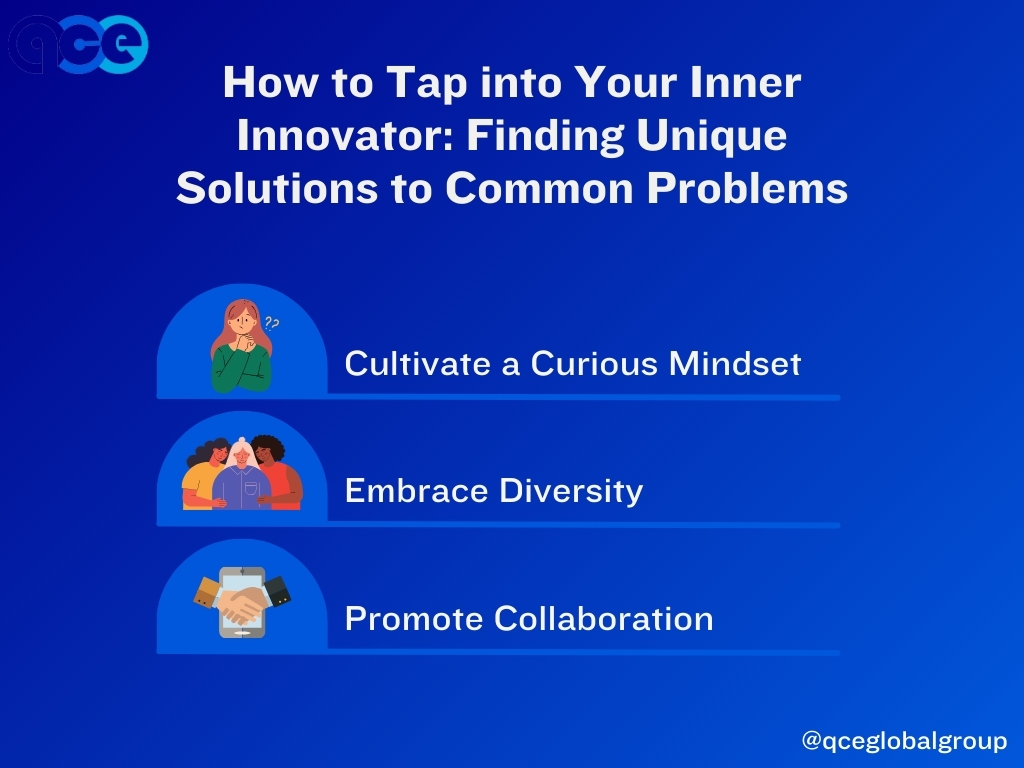
Each one of us possesses an inner innovator. It’s about tapping into this inherent ability that can lead us towards finding unique solutions for common problems. Creativity isn’t just about inventing something entirely new; sometimes it’s simply about improving what already exists. Take Airbnb for example: they didn’t invent the concept of lodging; rather they found an ingenious way through which anyone could convert their spare space into temporary lodgings for travelers – disrupting traditional accommodation industry norms along the way.
Tapping into your inner innovator requires two things: first, you must be open-minded enough to consider alternative perspectives or approaches towards problem-solving; secondly, you should have perseverance because innovation often involves trial-and-error before hitting upon the perfect solution.
- Cultivate a Curious Mindset: Embrace the ‘learner’s mindset’, always eager to learn new things and not afraid to question the status quo. This curiosity-led approach can often lead to unique insights and innovative solutions.
- Embrace Diversity: Surround yourself with diverse perspectives. Diverse teams tend to have a broader range of ideas, which can help in finding novel solutions to problems.
- Foster a Safe Environment: Encourage a culture where failure is seen as a stepping stone to success rather than a setback. This encourages risk-taking and experimentation, which are key to innovation.
- Promote Collaboration: Foster a culture of collaboration where ideas can be freely shared and built upon. This can often lead to the development of unique solutions that wouldn’t have been possible individually.
- Encourage Brainstorming: Regular brainstorming sessions can help in generating a wide variety of ideas, which can then be refined and fine-tuned into innovative solutions.
- Emphasize Continuous Improvement: Always look for ways to make things better. This continuous push for improvement can lead to incremental innovations that can significantly improve existing processes or products.
- Leverage Technology: Use technology to facilitate and accelerate the innovation process. This could involve using AI for data analysis, VR for product design, or collaboration tools for team communication.
- Adopt Design Thinking: Design thinking encourages empathy and puts the user at the center of the problem-solving process. This can lead to more user-friendly and innovative solutions.
- Invest in Training: Provide training and resources to help employees develop their creative thinking and problem-solving skills. This can help equip them with the tools they need to tap into their inner innovator.
- Reward Innovation: Recognize and reward employees who come up with innovative ideas or solutions. This can help motivate others to tap into their inner innovator and contribute their own unique ideas.
Remember, innovation isn’t a one-time thing. It’s a continuous process that requires constant nurturing and encouragement. With the right mindset and approach, anyone can tap into their inner innovator and find unique solutions to common problems.
‘Why?’ – The Question That Fuels Every Successful Start-Up
Every successful start-up begins with one critical question- ‘why?’. The ‘why’ is the core purpose, cause, or belief that inspires you to do what you do as an entrepreneur. It’s not about making money; it’s about making a difference. The most successful startups are those that are driven by their ‘why’. Take SpaceX for instance – Elon Musk’s vision isn’t just about building rockets; it’s about making life multi-planetary.
Asking ‘why’ helps entrepreneurs to stay focused on their mission and not get swayed by short-term gains or setbacks. This question forms the bedrock of strategic planning, decision-making, and team alignment in a start-up setting.
Here are the 10 Ways ‘Why?’ Fuels Every Successful Start-Up:
- Define Your Purpose: Start-ups can make their ‘why’ explicit in their mission statement. This helps to set the tone for the rest of the company and keep everyone on the same page.
- Create a Culture of Inquiry: Encourage employees to ask ‘why’ regularly. This promotes a culture of curiosity and continuous learning, which can lead to innovative solutions and ideas.
- Use ‘Why’ in Marketing: Use your ‘why’ to connect with customers on a deeper level. People are more likely to support a brand if they align with its values and purpose.
- Align Products and Services with ‘Why’: Make sure your products and services reflect your ‘why’. If your purpose is to promote sustainability, for example, all of your products should be environmentally friendly.
- Make ‘Why’ Part of Recruitment: Hire people who resonate with your ‘why’. They will be more engaged, motivated, and productive.
- Leadership Alignment: The leaders in your start-up should be the biggest advocates of your ‘why’. They should constantly communicate it and lead by example.
- Decision Making: Use your ‘why’ to guide decision making. Every decision should reflect and further your purpose.
- Strategic Planning: Incorporate your ‘why’ into your strategic planning. This helps to ensure that your long-term goals align with your purpose.
- Regularly Revisit ‘Why’: Regularly revisit your ‘why’ to make sure it’s still relevant and that you’re staying true to it. As your start-up grows and evolves, your ‘why’ may need to be adjusted.
- Customer Relationships: Use your ‘why’ to build strong relationships with your customers. If they understand and connect with your purpose, they’re more likely to become loyal customers.
Transforming Challenges into Opportunities: A Guide for Aspiring Entrepreneurs
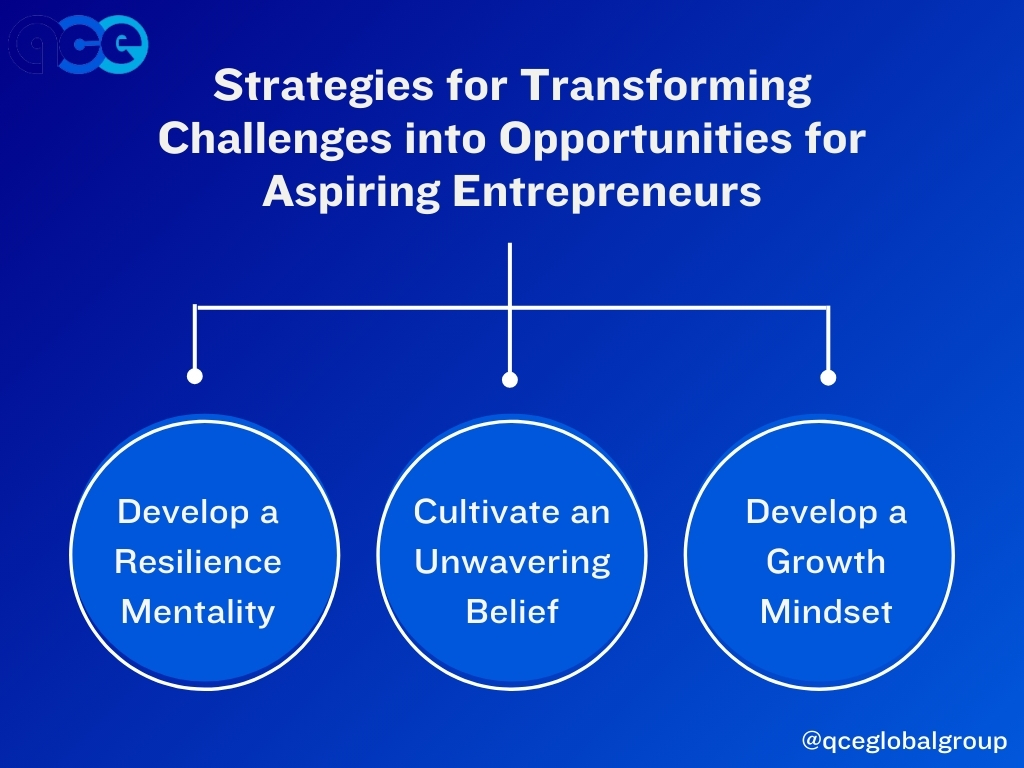
Entrepreneurship inevitably involves facing challenges. However, successful entrepreneurs are those who can transform these challenges into opportunities. Instead of viewing obstacles as roadblocks, they see them as stepping stones towards greater success.
Consider Richard Branson of Virgin Group, who faced numerous failures and rejections throughout his entrepreneurial journey but viewed each setback as a learning opportunity, eventually building one of the world’s most iconic brands. Such transformation requires resilience, creativity, and an unwavering belief in your venture’s potential – qualities every aspiring entrepreneur should strive to develop.
Here are the 10 Key Strategies for Transforming Challenges into Opportunities for Aspiring Entrepreneurs:
- Develop a Resilience Mentality: Aspiring entrepreneurs can cultivate a resilience mentality by embracing failures as a part of the journey, learning from them, and using them as stepping stones to achieve their goals.
- Foster Creativity: Entrepreneurs should always be on the lookout for creative solutions to overcome their challenges. This could involve innovative approaches to product development, marketing strategies, or business models.
- Cultivate an Unwavering Belief: Entrepreneurs should foster an unwavering faith in their venture’s potential. This belief can propel them through tough times and inspire others to believe in their vision.
- Adopt a Positive Mindset: A positive mindset can help transform challenges into opportunities. Entrepreneurs should see challenges as chances to learn, grow, and improve.
- Learn from Successful Entrepreneurs: Aspiring entrepreneurs can gain valuable insights by studying the journeys of successful entrepreneurs. Understanding how these individuals transformed their challenges into opportunities can provide inspiration and practical tips.
- Develop a Growth Mindset: A growth mindset, which involves believing that abilities and intelligence can be developed, can help entrepreneurs view challenges as opportunities for personal and professional growth.
- Leverage Resources and Networks: Entrepreneurs should utilize their networks and resources to overcome challenges. This could involve seeking advice from mentors, partnering with other businesses, or leveraging technology to improve operations.
- Embrace Change: The business landscape is constantly evolving, and entrepreneurs must be willing to adapt to these changes. By embracing change, they can turn potential threats into new business opportunities.
- Invest in Continuous Learning: The more knowledge and skills an entrepreneur has, the better equipped they are to solve problems and seize opportunities. Continuous learning can involve attending seminars, reading industry publications, or taking online courses.
- Encourage Team Collaboration: A diverse and collaborative team can generate a wide range of solutions to business challenges. Entrepreneurs should foster an environment where everyone feels comfortable sharing their ideas and perspectives.
Breaking Down Barriers with Effective Problem-Solving Strategies
One factor that sets successful entrepreneurs apart is their ability to break down barriers with effective problem-solving strategies. Rather than getting overwhelmed by problems or obstacles encountered along the way, they view them as puzzles waiting to be solved.
According to research published in Harvard Business Review (HBR), problem-solving skills rank first among leadership competencies worldwide. This includes analytical thinking and innovation- two key components necessary for breaking down barriers in business environments.
Effective problem solving begins with clearly defining what the issue is before brainstorming possible solutions – involving team members during this process can provide diverse viewpoints yielding more innovative outcomes.
Here are the 10 Strategies for Effective Problem-Solving in Business:
- Encourage a Problem-Solving Mindset: Cultivate a work environment that encourages employees to see challenges as opportunities to innovate. Make problem-solving a part of your organizational culture, fostering creativity and forward-thinking.
- Promote Analytical Thinking: Encourage your team to analyze situations, data, and feedback in detail. This will allow them to understand the root cause of a problem and create effective solutions.
- Inculcate the Habit of Defining Problems: It’s essential to teach employees to clearly define problems before starting to solve them. This will help in avoiding miscommunications and ensure everyone is working towards the same goal.
- Foster a Collaborative Environment: A collaborative approach to problem-solving can yield better solutions. Encourage your team to share their ideas, feedback, and perspectives.
- Implement Innovative Solutions: Encourage your team to think outside of the box and be open to unconventional solutions. This can lead to groundbreaking strategies that can overcome complex obstacles.
- Regular Training and Workshops: Regular training and workshops can help in honing problem-solving skills. Consider bringing in experts who can provide new perspectives and techniques.
- Use Technology: There are various problem-solving and brainstorming tools available that can streamline the process and increase productivity. Consider implementing these in your organization.
- Learn from Failures: Not every solution will work as expected. Learning from these failures can provide valuable insights for future problem-solving efforts.
- Reward Innovation: Recognize and reward those who come up with innovative solutions. This can motivate others to think creatively when faced with problems.
- Continuous Improvement: Always strive for improvement. Even if a solution works well, there might still be room for enhancement. This mindset can help in breaking down even the most formidable barriers.
Why Understanding the ‘Why’ is Essential for Startup Success
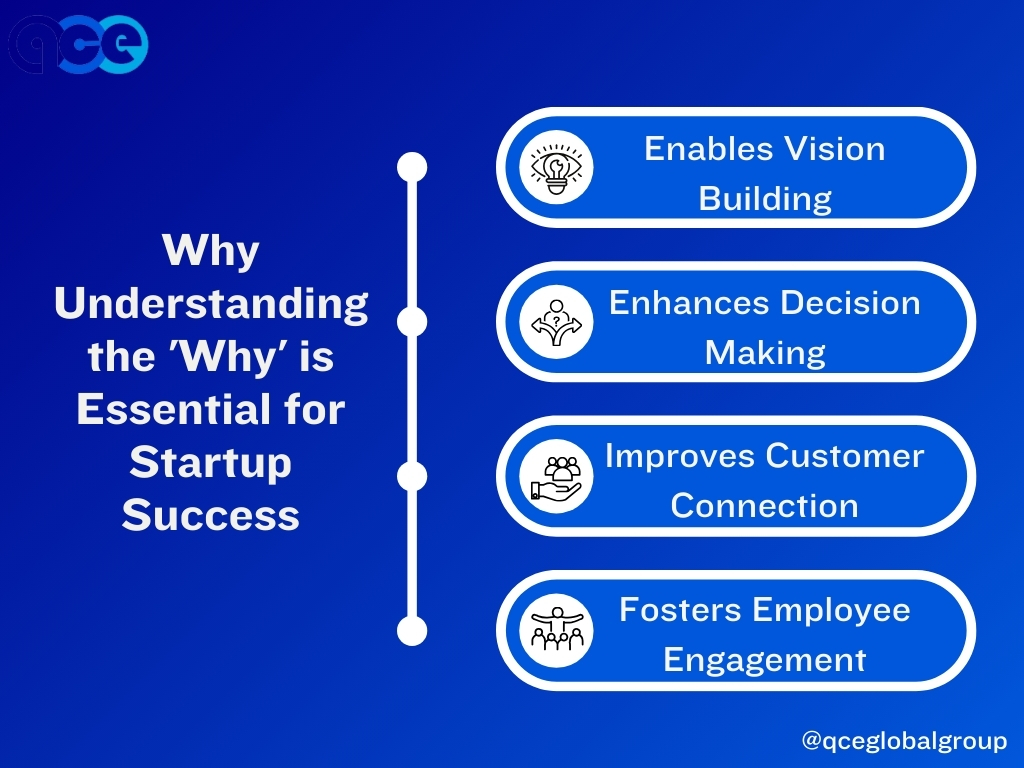
Understanding the ‘why’ is essential for start-up success as it lays the foundation for every aspect of your business – from product development to marketing and customer relations. It provides a clear direction, helps prioritize efforts, and forms the core of your brand’s value proposition.
A 2010 study by Bain & Company involving 760 telecom companies found that those who communicated their ‘why’ effectively had Net Promoter Scores (NPS) two times higher than the rest – showing greater customer satisfaction and loyalty. Having a strong ‘why’ can also foster employee engagement and motivation. According to Gallup, companies with high employee engagement are 21% more profitable because engaged employees are more productive and provide better customer service.
- Enables Vision Building: The ‘why’ forms the basis of the company’s vision and mission. It’s the reason the startup exists and what it hopes to achieve. This vision can then be communicated to stakeholders, including investors, employees, and customers.
- Enhances Decision Making: When the ‘why’ is clear, it becomes easier to make strategic decisions, from product development to hiring and partnerships. Every decision can then be aligned with the company’s core purpose.
- Improves Customer Connection: Customers are more likely to connect with a company that has a clear purpose that aligns with their values. The ‘why’ can differentiate a startup from its competitors and help build a loyal customer base.
- Fosters Employee Engagement: Employees who understand the ‘why’ are more engaged, motivated, and productive, impacting the overall performance of the startup positively.
- Guides Marketing Efforts: A clear ‘why’ can guide marketing and branding efforts, ensuring the company’s message is consistent and resonates with its target audience.
- Drives Innovation: Understanding the ‘why’ can drive innovation, as it challenges the startup to continually find new ways to fulfill its purpose.
- Boosts Investor Confidence: Investors are more likely to support a startup that has a clear purpose and strategic direction, as it’s often a sign of potential long-term success.
- Encourages Resilience: Startups that understand their ‘why’ can navigate challenges better, as they have a clear goal to guide them through tough times.
- Promotes Accountability: With a clear ‘why’ in place, startups can set measurable goals and KPIs, promoting accountability and performance tracking.
- Nurtures Brand Identity: The ‘why’ forms the core of the startup’s brand identity, creating a distinct image in the marketplace and helping the business stand out from the crowd.
‘What’s Your Why?’ – Clarifying Your Purpose and Vision as an Entrepreneur
Clarifying your purpose or ‘why’ as an entrepreneur is crucial for success. It’s what sets you apart from competitors, motivates you during tough times, inspires your team members, attracts customers towards your brand ethos, shapes strategic decision-making processes and ultimately defines long-term business objectives.
For example, consider TOMS shoes – their ‘why’ isn’t just about selling footwear; it’s about improving lives through their One-for-One model where each purchase aids a person in need- creating loyal customers who believe in this cause.
To identify your ‘why’, ask yourself what problem you’re trying to solve? How does addressing this issue align with what you’re passionate about or believe in? What unique value do you aim to bring into people’s lives?
Here are the 10 Examples of Defining Your ‘Why’ as an Entrepreneur:
- Eco-Friendly Apparel: Your ‘why’ could be promoting environmental sustainability by creating a line of eco-friendly clothing items. Your passion for environmental preservation would help attract customers who share the same values.
- Tech Solutions for the Elderly: If you’re passionate about helping the elderly, your ‘why’ could be creating user-friendly tech solutions to help them lead independent lives. Your unique value could be bringing convenience and comfort to their lives.
- Vegan Food Chain: Your ‘why’ could be advocating for animal rights by setting up a vegan food chain. Your mission could be to make vegan food more accessible and appealing to the masses.
- EdTech Startup: If you believe in the power of education, your ‘why’ could be creating a startup that offers innovative and affordable educational tools for remote learning.
- Mental Health App: Your ‘why’ could be addressing the mental health crisis by developing a mobile app that offers teletherapy services. Your passion for mental health awareness would resonate with users who find solace in your services.
- Sustainable Tourism Company: If you’re an avid traveler who cares about the environment, your ‘why’ could be establishing a sustainable tourism company. Your passion for travel and environmental conservation would attract like-minded tourists.
- Organic Beauty Products: If you believe in natural and cruelty-free products, your ‘why’ could be creating a line of organic beauty products. Your unique value would be promoting ethical beauty solutions.
- Green Energy Firm: Your ‘why’ could be solving the problem of excessive carbon emissions by establishing a green energy firm. Your goal could be to promote renewable energy sources for a sustainable future.
- Fitness Training Platform: If you’re passionate about health and fitness, your ‘why’ could be creating an online platform that offers personalized fitness training programs. Your mission could be to make fitness accessible and enjoyable for everyone.
- Social Impact Investment Firm: Your ‘why’ could be tackling income inequality by creating a social impact investment firm. Your unique value would be helping investors make socially responsible investments.
Final Thoughts
Understanding the ‘why’ in entrepreneurship is crucial to business success. It is the driving force behind a venture’s actions, decisions, and strategies. Successful entrepreneurs are those who have a clear sense of purpose and are able to identify unique solutions to existing problems. Curiosity, inquiry, creativity, perseverance, effective problem-solving, and the ability to turn challenges into opportunities are all essential attributes for entrepreneurial success. Furthermore, a strong ‘why’ helps in building an authentic brand identity and fosters customer loyalty and employee engagement, which ultimately leads to higher profitability. Therefore, it is imperative for aspiring entrepreneurs to clarify their ‘why’ or purpose, as it shapes their vision, influences strategic decision-making processes and defines long-term business objectives.
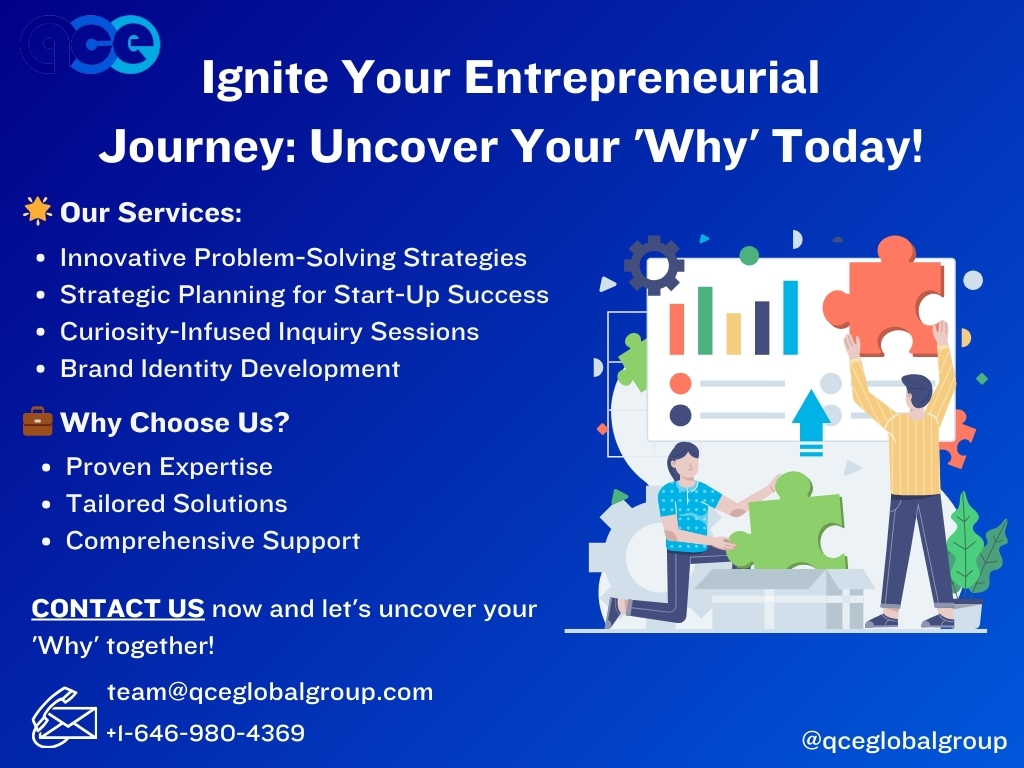
Don’t just dream about entrepreneurial success, take action now!
Contact us today and let’s start exploring your ‘why’, turning challenges into opportunities and transforming your business vision into a profitable reality!



